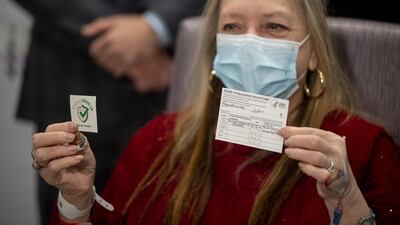The US Centres for Disease Control and Prevention on Monday released its first set of official guidelines for fully vaccinated people.
Two vaccines, the Pfizer-BioNTech and Moderna drugs, were approved in December 2020, while the Johnson & Johnson vaccine was approved at the end of February.
“With more and more people vaccinated each day, we are starting to turn a corner,” agency director Dr Rochelle Walensky said.
As of Monday, about 30 million people in the US had been fully vaccinated.
Here's a breakdown of the agency's message to fully vaccinated people:
Who is 'fully vaccinated'? How do I know if I am?
Fully vaccinated people are those who have had both doses of either the Pfizer-BioNTech or Moderna vaccine, or the single dose of the Johnson & Johnson vaccine.
The agency recommends that vaccinated people limit interactions for two weeks after their final dose.
What can I safely do now that I'm fully vaccinated?
Fully vaccinated people can safely visit and spend time with fully vaccinated people indoors without face masks or social distancing.
They can visit – also unmasked and without social distancing – another household that includes unvaccinated people if they are not at high risk of severe Covid-19 symptoms.
What precautions should I take?
If fully vaccinated people visit a household with someone who is at high risk, or visit a space hosting people from more than one household, they should wear a face mask and practise social distancing.
People at high risk of severe disease from Covid-19 may include those with cancer, diabetes, obesity, liver disease, heart conditions and other health problems.
They also include immuno-compromised people, smokers and those who are pregnant.
The guidelines say fully vaccinated people should still avoid big crowds or poorly ventilated spaces and continue to practise precaution in medium to large gatherings by wearing a face mask and social distancing.
Can I see family after my last dose?
Yes. Fully vaccinated people – two weeks after their last dose – can safely see and hug their family if they are also fully vaccinated.
"You can visit your grandparents if you have been vaccinated and they have been too," Dr Walensky said.
If family members are not fully vaccinated but are at low risk, everyone can gather indoors without a face mask or social distancing.
But if family members are at high risk of severe Covid-19 symptoms, everyone should continue to practise coronavirus mitigation measures.
Should I still enter quarantine and get tested?
Fully vaccinated people do not have to enter quarantine or be tested for Covid-19 if they receive news they have been exposed to the disease, if they remain asymptomatic.
If the fully vaccinated people experience Covid-19 symptoms, they should still be tested.
Can I get rid of my face mask?
No. Fully vaccinated people should still wear face masks.
The US health agency said that fully vaccinated people should wear their face masks when gathering with people at high risk, meeting people from more than one household or when in public spaces.
“Over 90 per cent of the population is not yet vaccinated, and that is our responsibility, to make sure in the context of 60,000 new cases a day that we protect those who remain unvaccinated and remain vulnerable," Dr Walensky said.
"So we’re doing our best to do that."
The agency also urged people to follow orders from businesses or workplaces that ask visitors to wear face masks.
There is a small chance a fully vaccinated person can still spread the virus to those who have not yet been immunised.
Can I travel if I'm fully vaccinated?
The agency is asking that people postpone domestic or international travel because daily infections are still at high levels.
"We remain in the midst of a serious pandemic and still over 90 per cent of our population is not fully vaccinated," Dr Walensky said.
"Therefore everyone, whether vaccinated or not, should continue to avoid medium and large-sized gatherings, as well as non-essential travel."
How can I prove I'm fully vaccinated?
The agency-issued card distributed at vaccination centres may be the only way people in the US can prove they have been inoculated.
There are efforts to introduce digital vaccination forms or apps, but nothing official has been created.
It may be a good idea to make an extra copy of the card after all doses have been taken, in case the original is misplaced.


